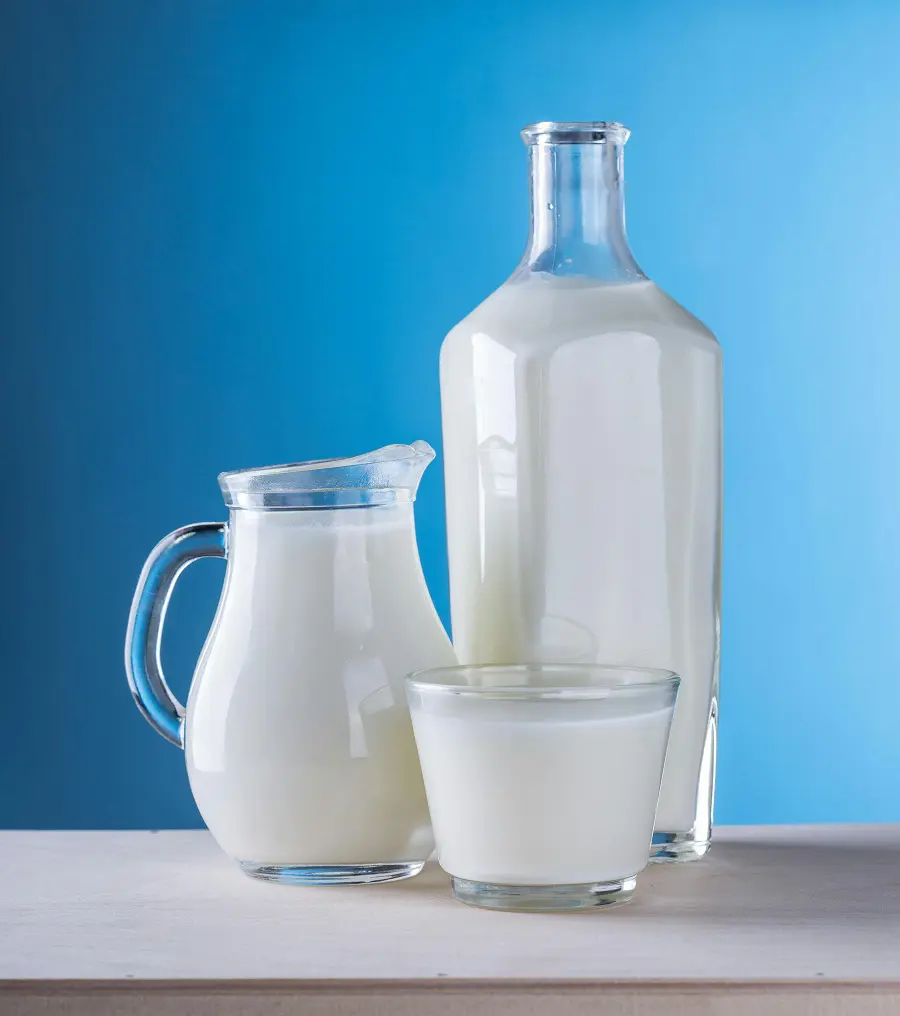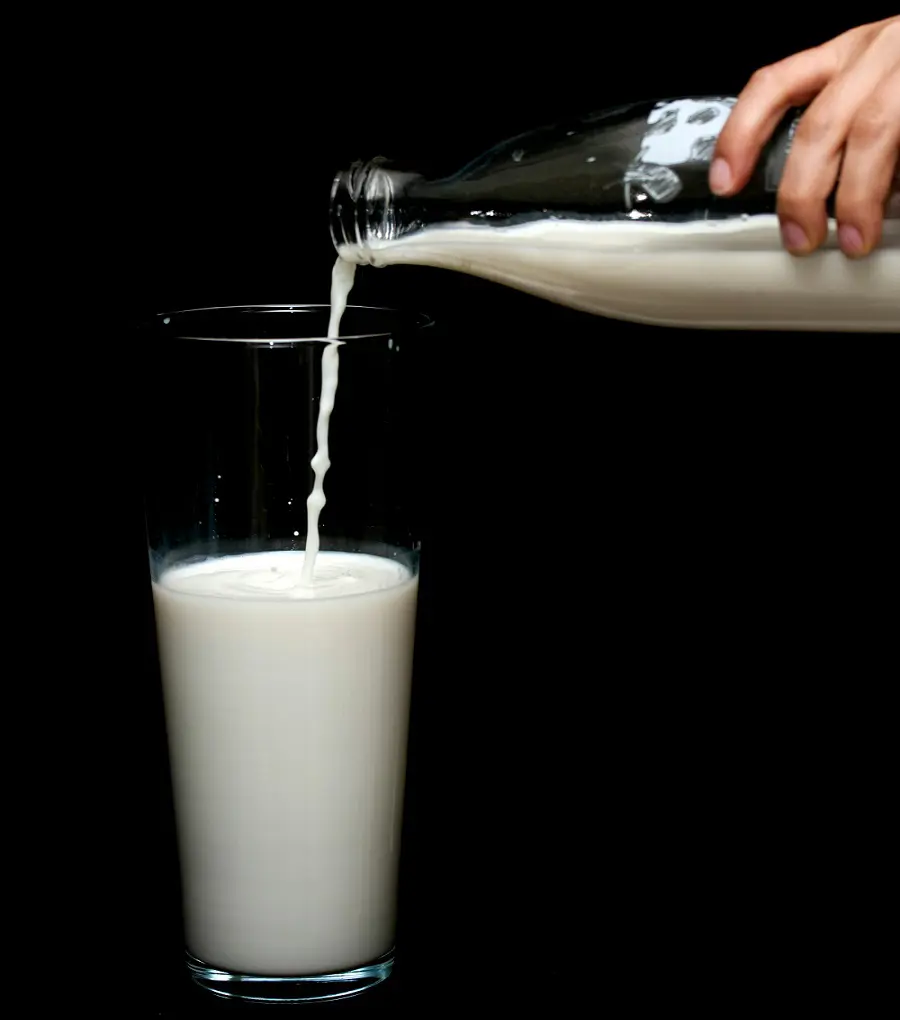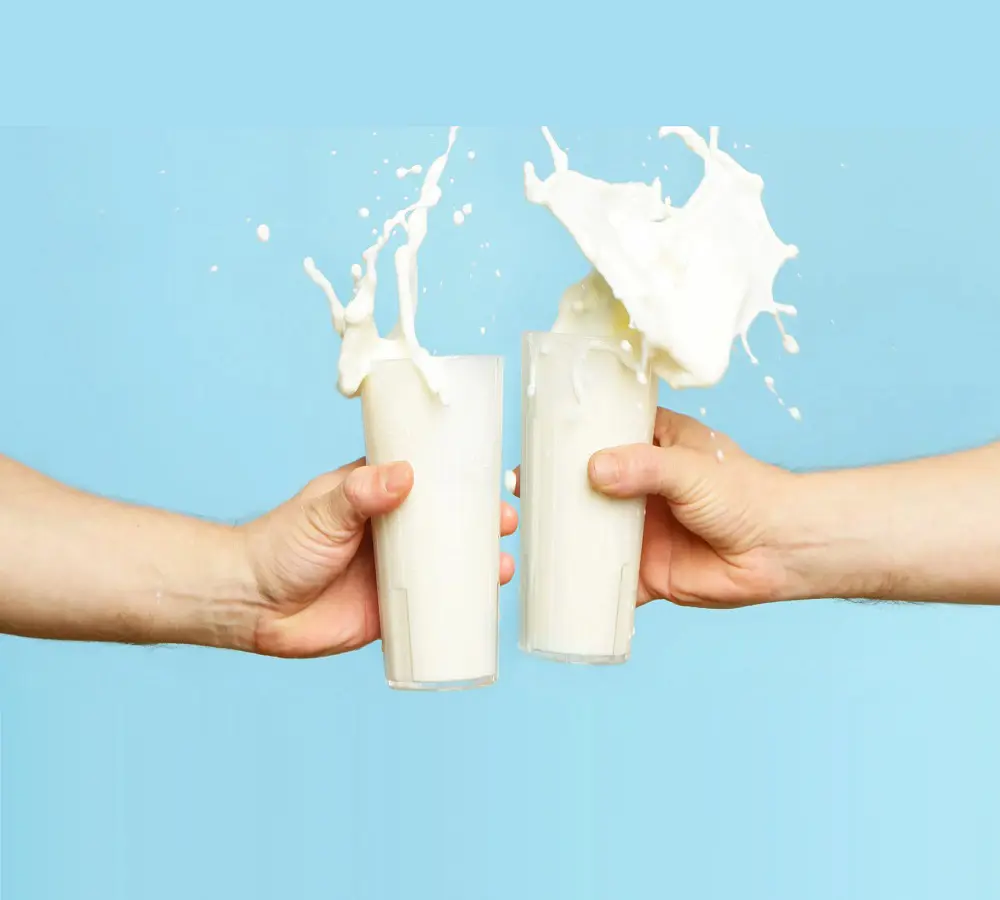Skimmed Milk Nutrition and Benefits For Your Health

Skimmed milk which is also known as fat-free or non-fat milk, is a great option for people who are health-conscious because it is a nutrient-rich, low-calorie substitute for full milk. Skim milk is rich in vital elements that promote bone health, muscle function, and general wellness.
Skimmed milk nutrition includes calcium, protein, and vitamins A and D. Its lower fat level preserves heart health and aids in weight management without losing nutritious value. Learn the many health benefits and skim milk nutritional info in your regular diet for a well-balanced way of living.
Skimmed Milk Nutrition Facts
Skimmed milk is a high-nutrient beverage that has very little fat and a range of important vitamins and minerals. The nutrition of skim milk in an 8-ounce (240 ml) portion typically has the following contents:
- Calories: 80-90
- Protein: 8 grams
- Carbohydrates: 12 grams
- Fat: 0-0.5 grams
- Calcium: 300 mg
- Vitamin D: 2.5 mcg
- Vitamin A: 150 mcg
- Potassium: 400 mg
- Phosphorus: 250 mg
Also, skimmed milk is a rich source of other vital nutrients that support immune system function, energy production, and general health, such as magnesium, zinc, and B vitamins like riboflavin (B2) and vitamin B12.
Its nutritional value is not greatly reduced by the removal of fat, which makes it a great choice for people who want to consume less fat but still get essential nutrients. As a result, it comes with several health benefits:
1. Low in Calories
Skimmed milk is low in calories, which makes it a great option for people who want to control their weight or cut back on calories without compromising vital nutrients. Compared to full milk, which has about 150 calories per serving, an 8-ounce serving only has about 80–90 calories.
Skim milk still has all the essential nutrients, including protein, calcium, and vitamins A and D, but with fewer calories. This makes it a beneficial dietary choice for people who want to control their calorie intake while maintaining a balanced diet, losing weight, or supporting general health.
2. High in Protein

Around 8 grams of protein are found in every 8-ounce (240 ml) serving of skimmed milk. Athletes and anyone leading active lifestyles should choose it because of its high protein content, which is beneficial for muscle building, and repair, and one skim milk nutrition facts that not many might know.
Also, protein is necessary for many other body processes, such as the synthesis of hormones and enzymes, immune system support, and the maintenance of healthy skin, hair, and nails.
Furthermore, meals high in protein, such as skim milk, can increase satiety, making people feel fuller for longer and assisting in weight management by lowering the chance of overeating. Skimmed milk is a great supplement to any diet because it has less fat but still contains important protein.
3. Rich in Calcium
An 8-ounce (240 ml) portion of skimmed milk contains around 300 mg of calcium or about 30% of the daily recommended consumption, it is one of many nutritional facts of skim milk.
Calcium has an essential function in bone density and the prevention of diseases like osteoporosis, as well as in the maintenance of strong bones and teeth. Furthermore, calcium facilitates healthy blood coagulation, neuron transmission, and muscular function.
Skimmed milk is a beneficial dietary item for supporting skeletal health and guaranteeing the effective functioning of numerous physiological systems since it maintains its high calcium content even after fat is removed. Its low-calorie content makes it a more appealing option for a healthy beverage.
4. Vitamin D Source
Skimmed milk contains high levels of vitamin D, which is necessary for bone health and good general health. The body needs calcium and phosphorus to form and maintain strong bones and teeth, and vitamin D improves this process.
About 2.5 micrograms of vitamin D, or 12% of the daily required requirement, can be found in an 8-ounce (240 ml) cup of fortified skimmed milk. Additionally, this vitamin helps to lower inflammation and support immunological function.
Frequent intake of skim milk enriched with vitamin D promotes skeletal health, lowers the risk of diseases like osteoporosis, and helps prevent deficits.
5. Low in Fat

Less than 0.5 grams of fat are present in every 8-ounce (240 ml) serving of skimmed milk. With its low-fat level, it's a great option for anyone trying to cut back on fat in general, especially saturated fat, which raises the risk of heart disease and high cholesterol.
In contrast to full milk, which contains roughly 8 grams of fat per serving, skimmed milk offers vital nutrients including vitamins, calcium, and protein without increasing calorie intake from fat.
This makes it a heart-healthy choice that maintains overall wellness and helps with weight management without sacrificing nutritious content.
6. High in Potassium
Skimmed milk is high in potassium, a vital element that helps maintain a variety of body functions. Approximately 400 mg, or 8% of the daily recommended intake, can be found in an 8-ounce (240 ml) cup of skimmed milk.
Because it promotes cardiovascular health and helps regulate the body's sodium levels, potassium is essential for sustaining normal blood pressure. It also supports healthy neuron and muscle function as well as fluid balance.
You can ensure that you are getting enough potassium in your diet by including skimmed milk, which will improve your overall state of health.
7. Good Hydration
Skimmed milk is a good hydration beverage because it contains around 90% water. Not only does it successfully satisfy thirst, but it also provides the body with potassium and sodium, two important electrolytes that are vital to preserving the right fluid balance.
It has the added benefit of offering a variety of essential nutrients, including vitamins, calcium, and protein, in contrast to plain water. This keeps you sufficiently hydrated and promotes general health and well-being.
Its low fat and calorie content also makes it an excellent option for people who want to stay hydrated without consuming too many calories.
8. Low Cholesterol

Skimmed milk has much lower cholesterol levels than whole milk due to its lower fat content and not many might know about this skim milk nutritional information.
The main source of cholesterol is milk fat. The majority of this fat is removed in skim milk, which significantly lowers cholesterol.
A typical portion of skim milk has only about 5 milligrams, but a whole serving of whole milk has an astounding 24 milligrams. For people who actively control their cholesterol consumption, because of this, skim milk is a great choice.
9. Rich in Riboflavin (B2)
Skim milk is more than just for drinking and satisfying hydration. It's a good source of vitamin B2, or riboflavin, which is essential for your body to produce energy. Riboflavin supports your metabolism by assisting in the conversion of meals into useful energy.
It's also necessary for the neurological system, eyes, and skin to work normally. One cup (8 ounces) of skimmed milk provides a substantial portion of your daily required intake of riboflavin.
Moreover, this vitamin functions as an antioxidant to protect your cells from harm. Hence, skim milk can enhance your energy levels and general wellness when added to a balanced diet.
10. Source of Vitamin B12
One of the many nutrition facts of skim milk is that it provides an unexpected vitamin B12 boost. This necessary vitamin promotes red blood cell development, DNA synthesis, and normal neuron function. A single 8-ounce dose contains approximately 20% of the daily required B12 intake.
A lack of vitamin B12 can cause anemia, impair cognitive function, and interfere with the metabolism of energy.
Given that animal sources are the primary source of B12, skim milk presents a beneficial low-fat alternative for individuals trying to meet their dietary requirements.
11. Improves Digestion

Skimmed milk can benefit digestion in a variety of ways. Compared to whole milk, which can be heavier and more difficult to digest, it has less fat, which makes it easier for the stomach to consume.
Moreover, lactose, a naturally occurring sugar in skim milk, encourages the development of advantageous gut flora and supports a healthy digestive tract. The high protein content, particularly casein, is slowly digested, resulting in a consistent release of nutrients and reducing stomach pain.
Also, the minerals and vitamins in skim milk like calcium and vitamin D, support the digestive tract's general health by improving nutrient absorption and encouraging regular bowel movements.
12. Promotes Healthy Skin
Skimmed milk's nutrient composition makes it an excellent ally for good skin. Skim milk contains vitamin A, which is necessary for cell growth and repair and glowing, smooth skin.
Protein keeps skin supple and aids in tissue repair. In addition to keeping your skin hydrated, skim milk's reduced fat level reduces the likelihood of breakouts and blocked pores.
B vitamins in skim milk can also improve cell regeneration and general metabolism, which helps you look younger.
13. Supports Metabolism
Given its nutrient content, skim milk can be a useful beverage to support a healthy metabolism. One important factor is the high protein content of skim milk. Building and mending tissues throughout the body depends on protein.
The body needs more energy to break down protein than it does fats or carbs, which raises the metabolic rate. Talking about nutritional information skim milk contains a lot of B vitamins, especially vitamin B12 and riboflavin (B2).
Because they facilitate the conversion of food into energy that can be used, these B vitamins are essential for the creation of energy and assist support many metabolic processes. Hence, skim milk can increase metabolic efficiency by offering vital nutrients with a low-calorie content.
14. Aids Weight loss
Skim milk has the potential to be an effective weight-management strategy. It has a lot fewer calories (around 80–90 per 8 ounces) and nearly no fat than whole milk. This results in a calorie deficit, which is necessary to lose weight.
Furthermore, skim milk has a high protein content (approximately 8 grams per serving), which helps you reduce your overall food intake by lowering cravings and prolonging feelings of fullness.
Evidence even suggests that the calcium in skimmed milk may improve fat metabolism, contributing to the reduction of body fat.
15. Boosts Immune System
Skimmed milk has elements that support a healthy immune system. It contains vitamin A, which helps white blood cells, which are essential for warding off infections, proliferate and function.
Vitamin D decreases inflammation and enhances the immune response by increasing the capacity of macrophages and monocytes to fight infections. B vitamins, which are included in skim milk, also contribute to the maintenance of energy levels, which is crucial for immune system function.
Skim milk's high-quality protein gives the body the critical amino acids it needs to produce new immune cells. It contains a variety of elements that when combined strengthen the body's defenses and support general immunological health.
Whole Milk Vs Skim Milk
Because of its high protein and fat content, whole milk may help in muscle growth. According to some research, its fat content may not be as harmful as previously believed.
On the other hand, skim milk is an excellent option for people who worry about their fat intake and trying to lose weight. It may be replenished after exercise and offers vital nutrients for hydration. The following represents some differences between whole milk and skim milk based on certain factors:

Fat Content:
- Whole milk: It has a fat level of about 3.25% and has a richer flavor and creamier texture.
- Skim milk: Has a thinner consistency and milder flavor, with less than 0.5% fat and much fewer calories.
Nutrients:
Both include comparable amounts of protein, calcium and some B vitamins. But, whole milk is naturally higher in vitamins A, D, and E, although some producers supplement skim milk with these nutrients as well.
Calories:
- Whole milk contains around 149 calories per cup.
- Skim milk contains around 83 calories per cup.
Recent posts
Nutrition
Nutrition
Licorice Root: Benefits And Uses
You can spell it liquorice or licorice; this herb or root has been in use for centuries in most medicinal applications, as a natural sweetener and to enhance flavors. Regarding its origins, it comes from the root of the "Glycyrrhiza galbre" plant and...
Nutrition
Is Salmon Good For You? Nutritional Facts and Benefits
Salmon fish is a staple diet throughout the world, popular as a super food for its nutrients. Whether savored in sushi, poached, grilled, roasted, or pan-fried, salmon offers minerals and vitamins that contribute to healthy bodily functions. In addit...
Nutrition
25 Smoked Salmon Recipes That You Will Enjoy
Salmon is a silver-colored fish that is loaded with many nutrients, vitamins, and omega-3 fatty acids. Smoked Salmon is better for improving your health and reducing the risk of cancer, heart-related diseases, fights inflammation, reduces anxiety and...
Nutrition
Are Sausages Healthy? Nutrition And Health Benefits
Sausages are tasty in an addictive way, making them one of the most popular foods worldwide. You may have enjoyed this convenient food often, whether on a bun with mustard or grilled on a barbecue, the simple preparation methods are what makes its co...
Nutrition
20 Vegetables That Are Rich In Iron
Iron is essential for our bodies to function well. When we don't get enough iron, we often feel weak and tired. It's important to address iron deficiency early by eating the right foods. Fortunately, many vegetables are rich in iron and can help prev...
Nutrition
15 Cauliflower Nutrition Facts And Health Benefits
Cauliflower, a cruciferous vegetable, resembles a white variation of its relative, broccoli. Like broccoli, it has closely bunched florets attached to a thick core, often surrounded by a few leaves. While white is the most common color, cauliflower i...







